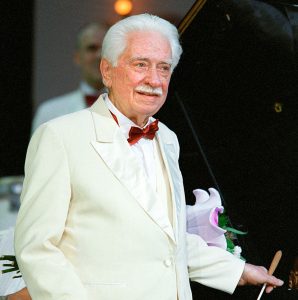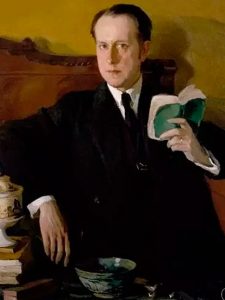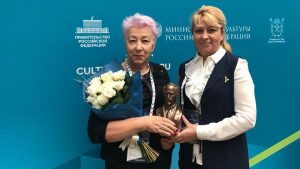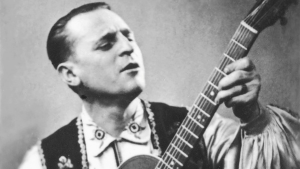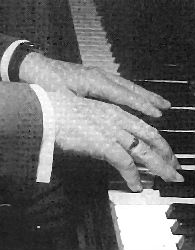ANTONIO VIVALDI – ITALIAN BAH
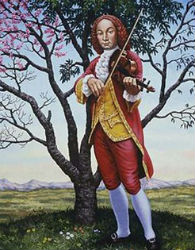 It took almost two centuries for humanity to learn, understand and appreciate the music of the great Antonio Vivaldi again, because soon after his death he was unfairly forgotten. In the XIX century, he was mentioned only as a person whose notes were copied by Johann Sebastian Bach. And only at the beginning of the 20th century a miracle happened – many of his works were found, and Vivaldi’s music swept the world, touching the souls of people and becoming the basis of the repertoire of famous orchestras.
It took almost two centuries for humanity to learn, understand and appreciate the music of the great Antonio Vivaldi again, because soon after his death he was unfairly forgotten. In the XIX century, he was mentioned only as a person whose notes were copied by Johann Sebastian Bach. And only at the beginning of the 20th century a miracle happened – many of his works were found, and Vivaldi’s music swept the world, touching the souls of people and becoming the basis of the repertoire of famous orchestras.
In the power of sounds
After finding such a treasure trove, Antonio Vivaldi took the place of honor of a recognized genius in the history of music. His works are familiar to everyone and loved by many, although not everyone can tell about the life of a composer. What was in it?
Antonio Vivaldi was born in the Republic of Venice, it happened on March 4, 1678. The baby was born prematurely and was very weak. Later it became clear that the boy was sick with asthma, he was tormented by seizures of asphyxiation, it was hard for the child to walk, and climbing the stairs equated to torture. But no physical defects have affected the wonderful inner world of Vivaldi. His fantasy did not know barriers, but life was abundant in colors, it only happened in the world of music.
Church of St. John in Bragora, where Vivaldi was baptized Church of St. John in Bragora, where Vivaldi was baptized
A new stage in the life of Antonio began when his father, barber Giovanni Batista, received an invitation to the chapel of the Cathedral of San Marco. Then it was the largest orchestra of all Italy. Four organs, an orchestra and a big choir provided a magnificent sound. This so struck the imagination of seven-year-old Antonio that he never missed rehearsals and eagerly listened to the music of outstanding masters. Such a selfless immersion in art could not go unnoticed. Soon the famous violinist and teacher Giovanni Legrenti became interested in the boy. In addition to musical knowledge, he instilled in Antonio a desire to experiment. To more accurately and vividly express his thoughts, Vivaldi began to create works and look for new forms. By the way, the composer’s creations created by him at the age of 13 have survived. But at this age young Antonio was waiting for a serious change.
Red priest
Given the poor health of his son, Giovanni Batista decided that it would be better if Antonio became a priest. Vivaldi did not disobey his father. Over time, he received the composer Antonio Vivalditonzuru and the title of “goalkeeper” – he opened the gates of the temple. Later he took several more degrees of consecration in order to receive the title of priest and to have the right to serve the mass. For several years, young Vivaldi comprehended the knowledge of the church, although his heart was constantly creative. Fate had mercy on Antonio, and once he got the opportunity to do what he loved. It was rumored that during one of the services the “red priest” (so he was nicknamed for the characteristic hair color) constantly left the altar in order to quickly record the melody that visited his head. After such liberties, Vivaldi was removed from services, and music again became his main occupation.
Head of the Conservatory
A witty young man with expressive eyes and long hair masterfully owned a violin and other instruments, he always showed compassion to others and was a welcome interlocutor. Thanks to the received spiritual dignity, he was able to become a teacher in one of the women’s conservatories of the city-republic. The future seemed very promising to Antonio. composer Antonio Vivaldi He was not disturbed even by disagreements with the clergy. Vivaldi plunged into the world of creativity and became the universal favorite in Venice.
He enthusiastically worked at the Pieta Conservatory. Conservatories then called shelters at monasteries, which gave a good education, and music as well. Antonio was first officially called the choir director, and later became the conductor. Vivaldi also taught Pita pupils how to play various instruments, taught vocals and constantly wrote music. This conservatory was well known to Venetian music lovers, and now under the leadership of Antonio Vivaldi has turned into the best in the whole republic. Rich citizens hurried to give there their daughters.
Inimitable virtuoso
Antonio worked in Piet almost all his life with minor interruptions and most of Vivaldi’s spiritual works wrote for his native conservatory. He created cantatas, hymns, masses and oratorios. Although now his sacred music remains in the shadow of concerts. In the conservatory, he managed to harmoniously combine secular and spiritual music. Since he had a wonderful orchestra, Antonio could immediately hear the sound of his new works. The composer created over 450 concerts for the Pieta orchestra, and often he himself played the violin. At that time, few could compete with him in virtuosity. For these achievements, his name was published in 1713 in the Venice Guide.
